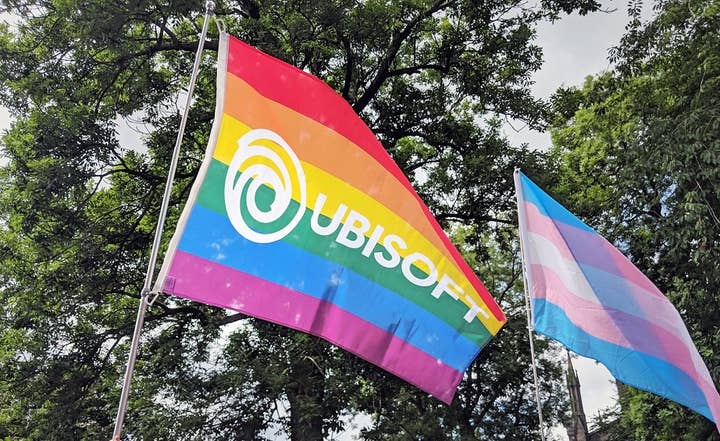Are corporate celebrations of LGBTQ Pride progress?
Two queer non-binary game developers discuss whether there's an upside to pinkwashing during a devcom session
Lots of companies talk a good game when it comes to LGBTQ issues. Fewer companies actually follow through on it.
Insincere gestures to LGBTQ people are common enough that they've spawned a small lexicon of terms like pinkwashing, queerbaiting, and rainbow capitalism.
Beyond that, they also spawned a discussion at Devcom this week between two queer and non-binary developers about whether or not such gestures can actually do some good.
In a session titled "Non Binary Tea - Fake Inclusivity and Blooming Community," Big Bad Wolf writer Pierrick Haëm and freelance narrative designer Sybil Collas addressed the issue, with Haëm broaching the subject by talking about their difficulty working at Ubisoft while the publisher had a week-long Pride event.
"It's quite difficult for gender minorities because there's this idea that you have to be open, to talk a lot"
Pierrick Haëm, on a week-long Pride event at Ubisoft
"Actually, it's quite difficult for gender minorities because there's this idea that you have to be open, to talk a lot," Haëm said of the Pride event. "You have to answer every question. It makes sense. It's logical, but you do have to show pedagogy and to be patient. And you have to debate if you're gendered sometimes, if your own identity is supposed to exist or not. Or if it's ok for you to be here. I don't want to debate about that. I'm here."
Collas said they understood how the pressure of having to talk about or justify their existence to people they don't even speak to usually could be harmful.
"I can understand the fact that the queer employees were under that pressure to communicate because it was the event, it was the moment, and it was their 'role' somehow," Collas said. "That's a shitty take on it, but from the outside, we had so many resources suddenly available to people, and that was really, really cool."
Collas was working with Ubisoft on a freelance basis at that point, and said they welcomed Ubisoft's celebration at the time.
"Ubisoft is huge," Collas said. "It's not a small company. It has an impact on the industry as a whole, and you really had that notion of seeing a company that massive do something like that has the power to make others consider it."
It also produced some tangibly positive results in their experience.
"I had a client who was... a bit picky about queer characters and characterization. And the fact that Ubisoft did that stuff, especially in sharing resources about it, made them change their mind"
Sybil Collas
"At that moment, I had a client who was... a bit picky about queer characters and characterization," they said. "And the fact that Ubisoft did that stuff, especially in sharing resources about it, made them change their mind."
They added, "I wanted to have transgender characters because I do not see that often in games, and it basically means I don't see myself often in games. At first it was a huge 'No.' But then Ubisoft did their thing and then, 'Ah, maybe. If Ubisoft does it we could do it.'"
Haëm conceded they had received some supportive comments from co-workers and people in human resources during the Pride event, but added that it was definitely pinkwashing.
Collas agreed that pinkwashing isn't ideal, but added, "I would much prefer a company saying 'We are doing queer characters' even if we don't believe in that' rather than having a company saying, 'We don't really believe in that and we're not really talking about it either. And we're not making any efforts to include people.' You disagree?"
"Actually I do agree," Haëm replied. "I just don't want to be happy for baby steps."
They acknowledged that things are "going step by step in the right direction," but also cautioned that companies engaged in pinkwashing can use that against their LGBTQ employees, pointing to public support of Pride events and the like to shield themselves from criticism.
Collas said they generally try to highlight positive stories like their employer's change of heart on a transgender character, but it's largely because those stories are so rare. Their own experience with getting queer characters in games has been mostly negative.
They recalled one time where they wrote a bisexual woman character in a game whose bisexuality was largely incidental to the character, but their boss nixed the idea.
"My boss told me that the players would not want that," they said, adding, "The main problem with that sentence and why it's super violent to say that is that it's not, 'The players do not want that.' It's 'I do not want that.'
"It was him telling me that it was not something he wanted to see. And I think it's a super huge problem to believe that the players are reflected by yourself. A sole developer will never envelop the whole scope and range of all the characters and all the players that exist. It's not possible that one single dude -- usually a cisgender, white, straight male -- will represent everyone."
Haëm asked if that was a form of cis gatekeeping, an idea that Collas immediately took to.
"It really comes from who makes the game," Collas said. "We may be the one non-binary person on the team, but the diversity of the team really influences the product we make, not just in video games but in culture in general."
"And the diversity of people who actually have responsibilities in this process," Haëm added. "You can have diverse teams but if the people in charge of making the decisions, well..."
Collas agreed that teams need to not just have marginalized people on them but put them in key positions, saying, "Agency is the name of the game."

